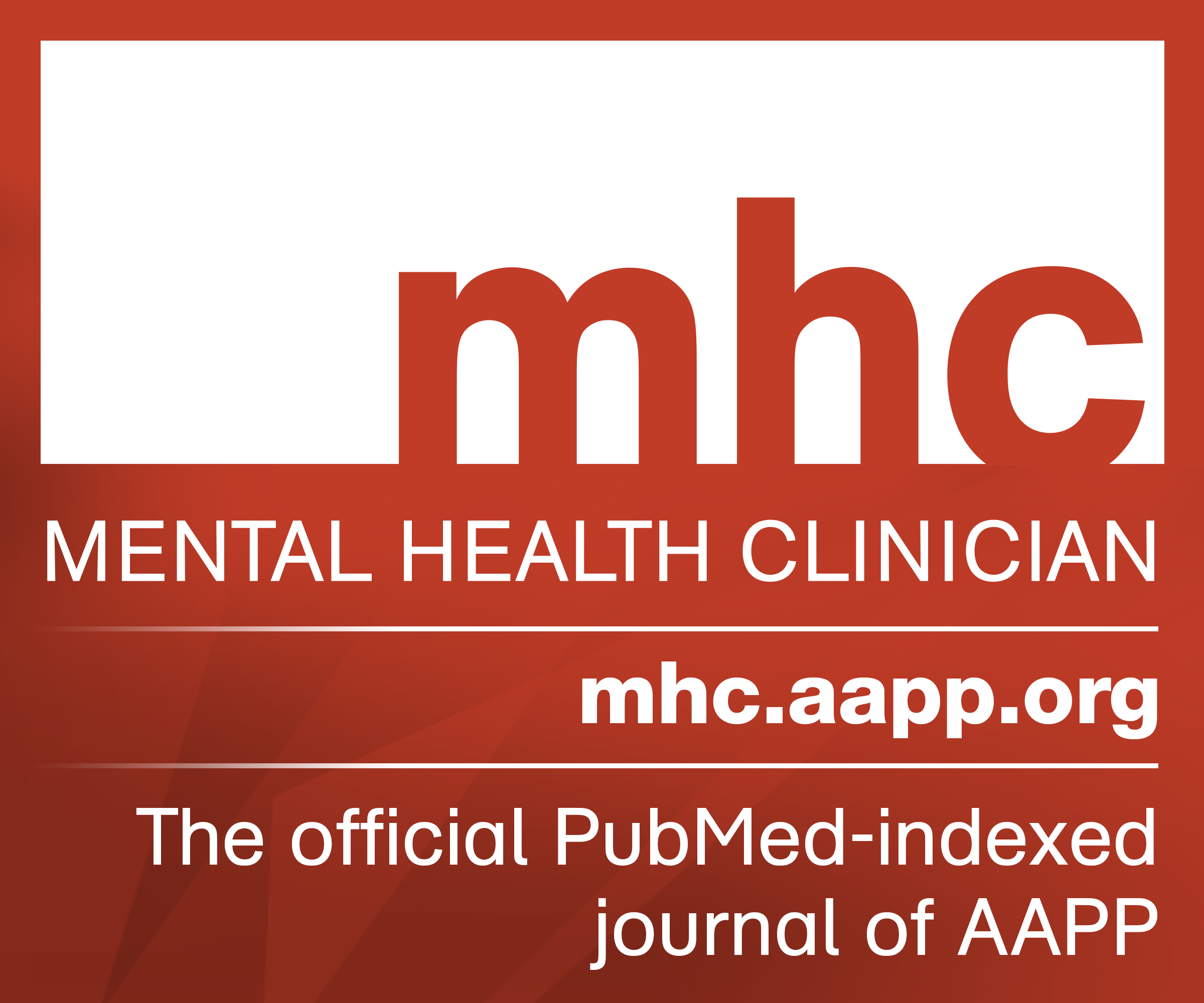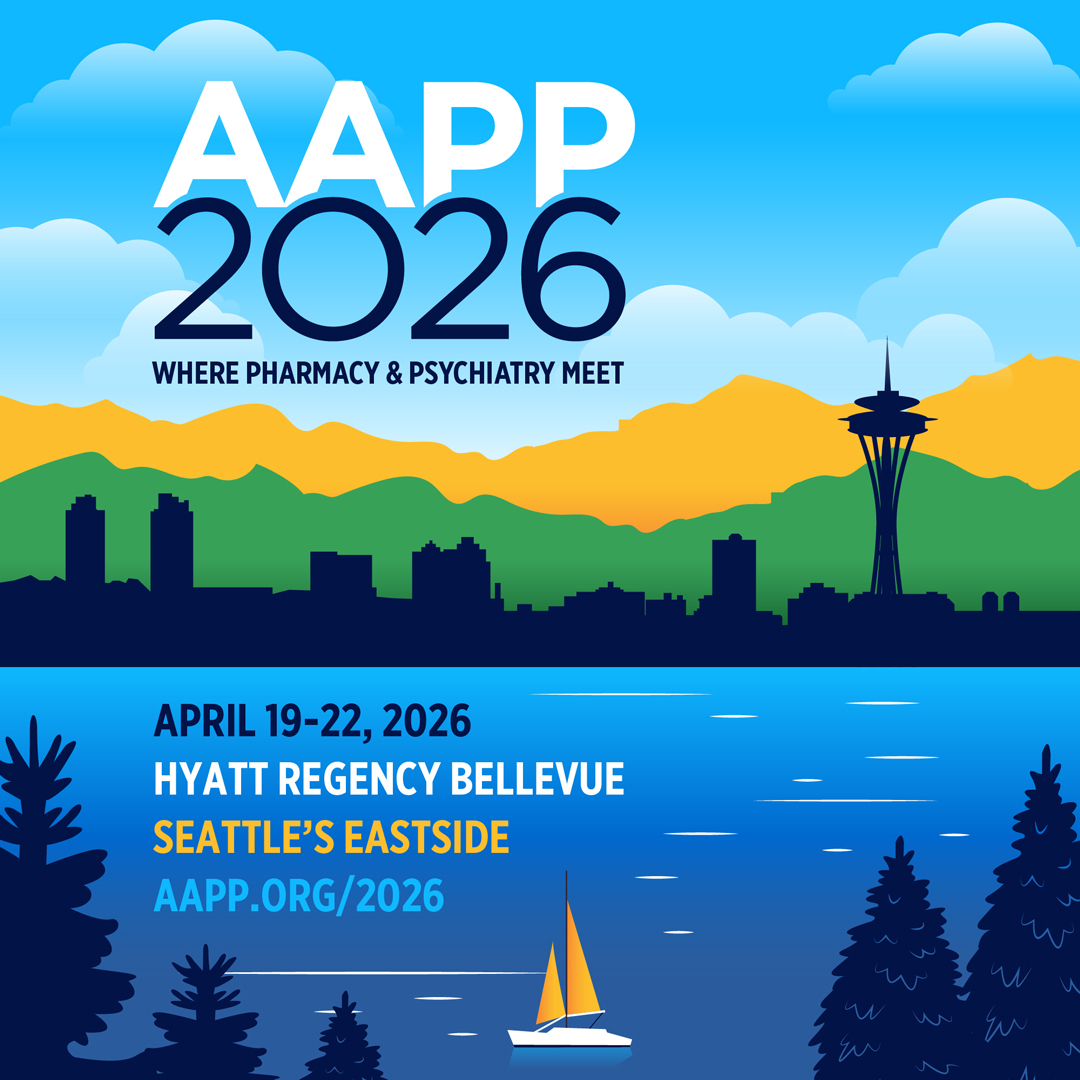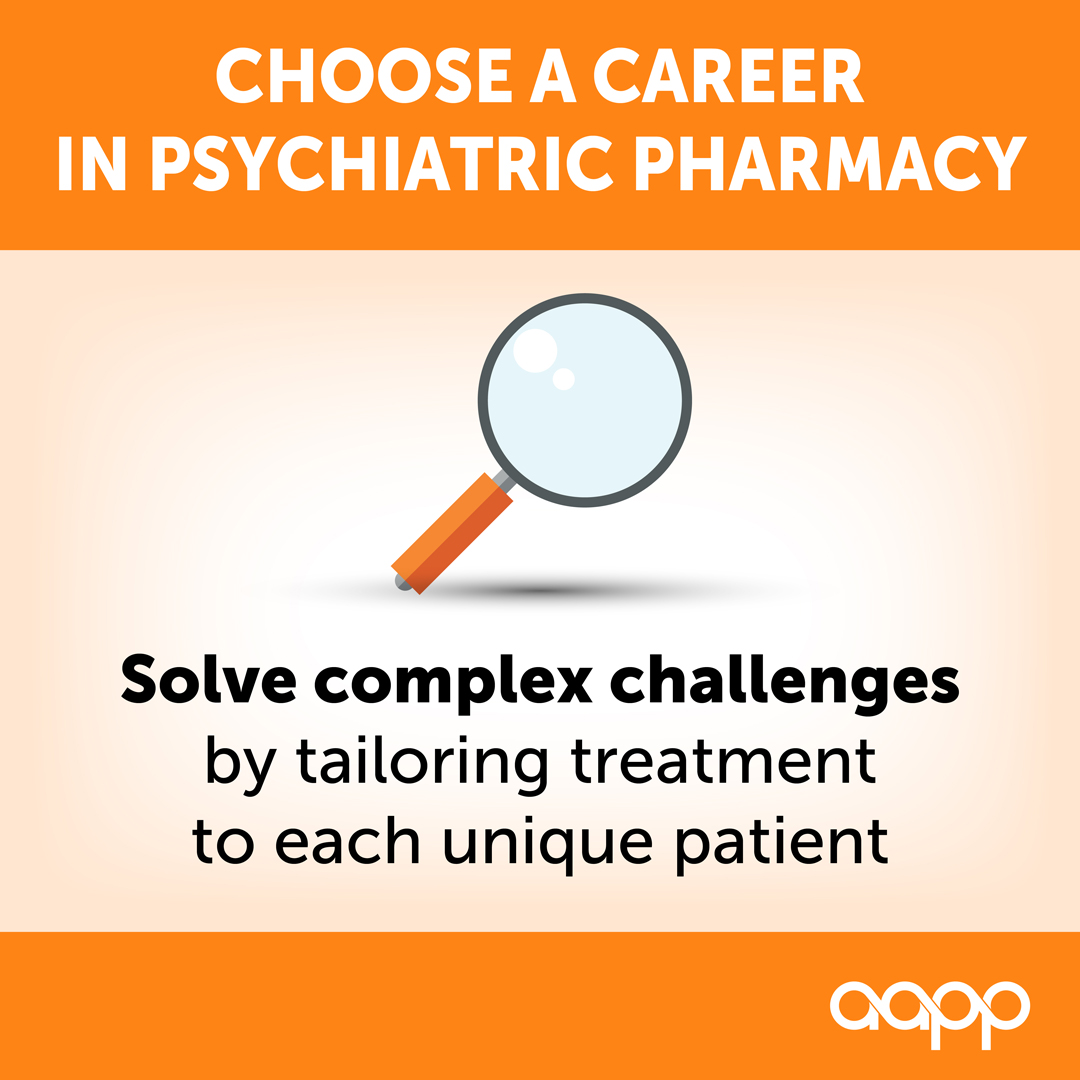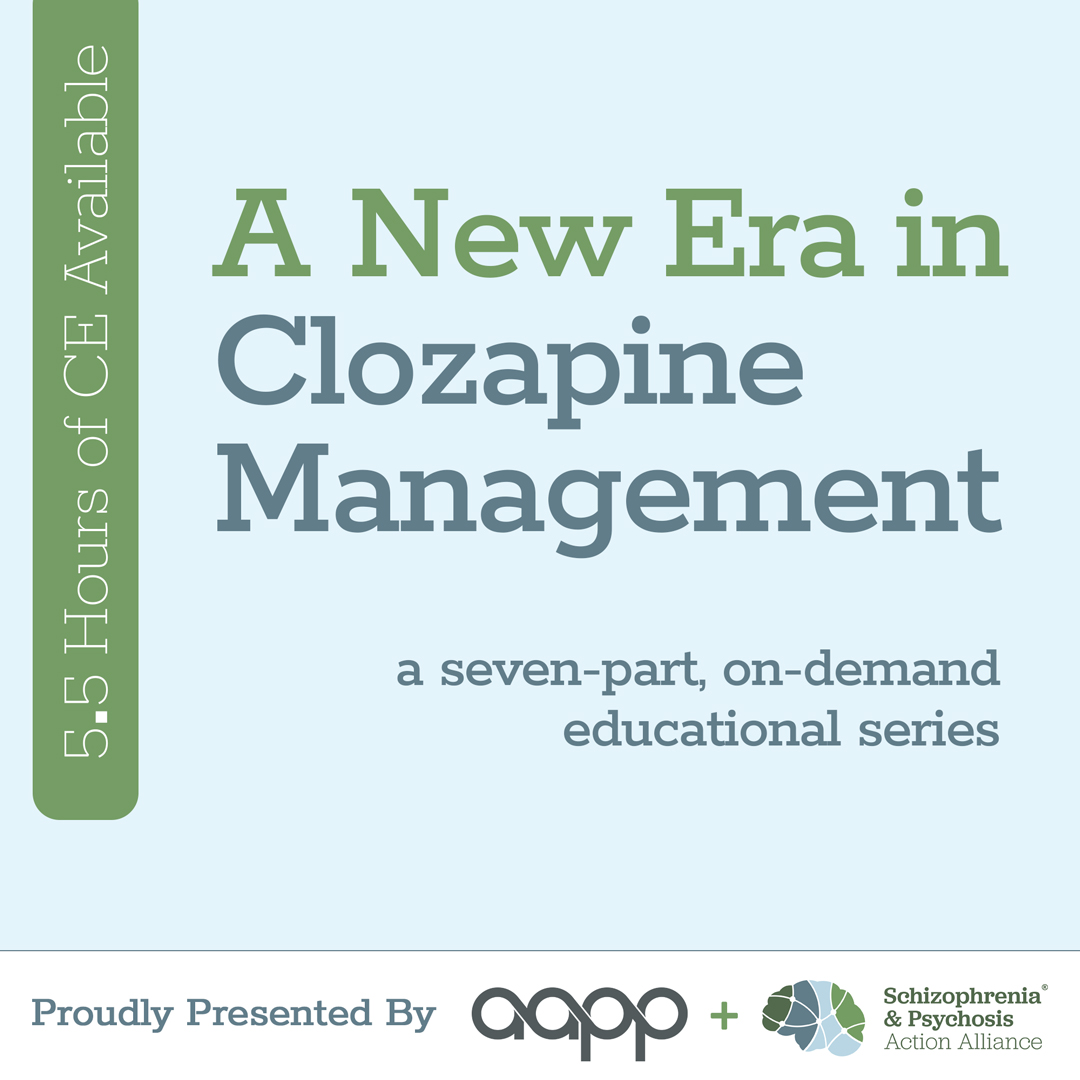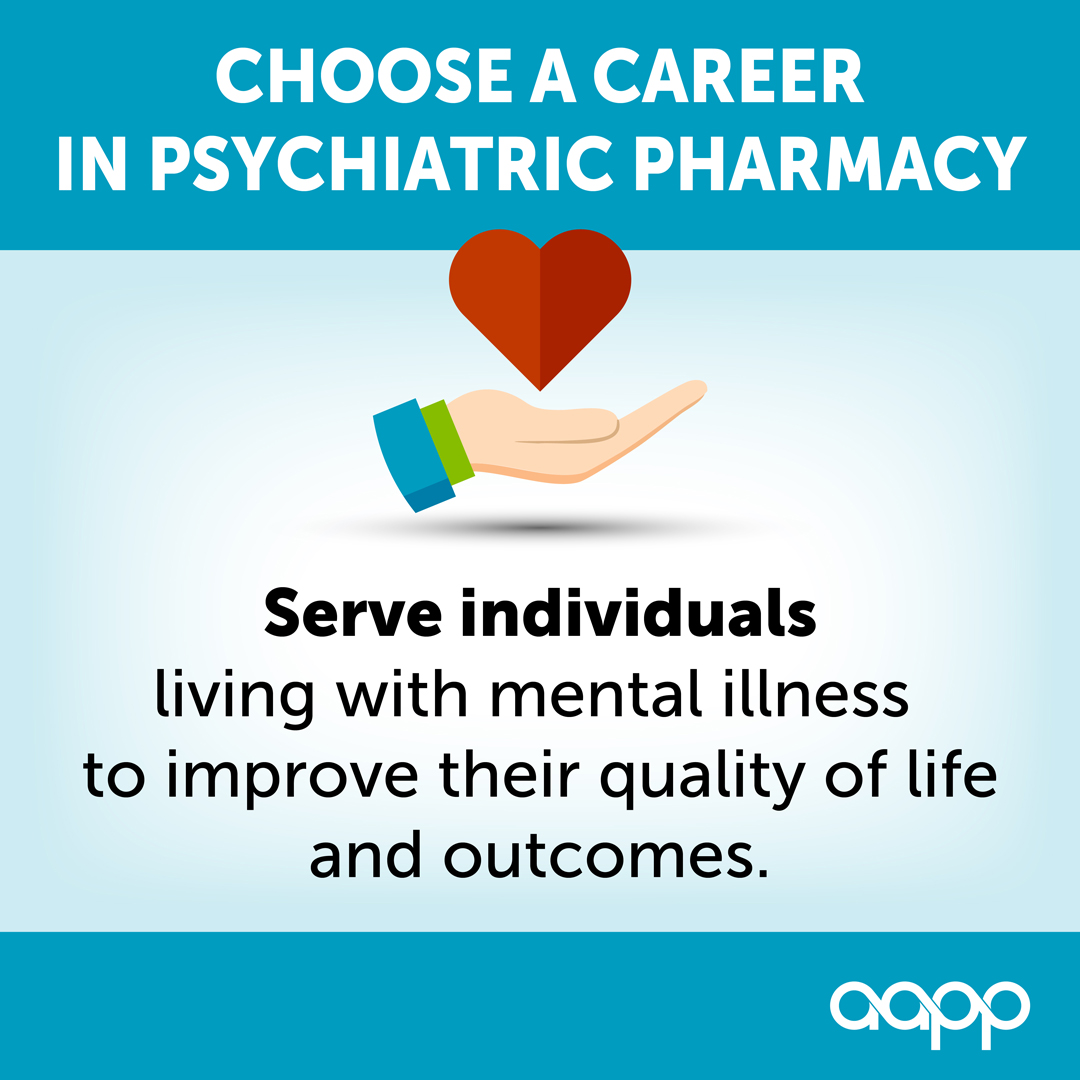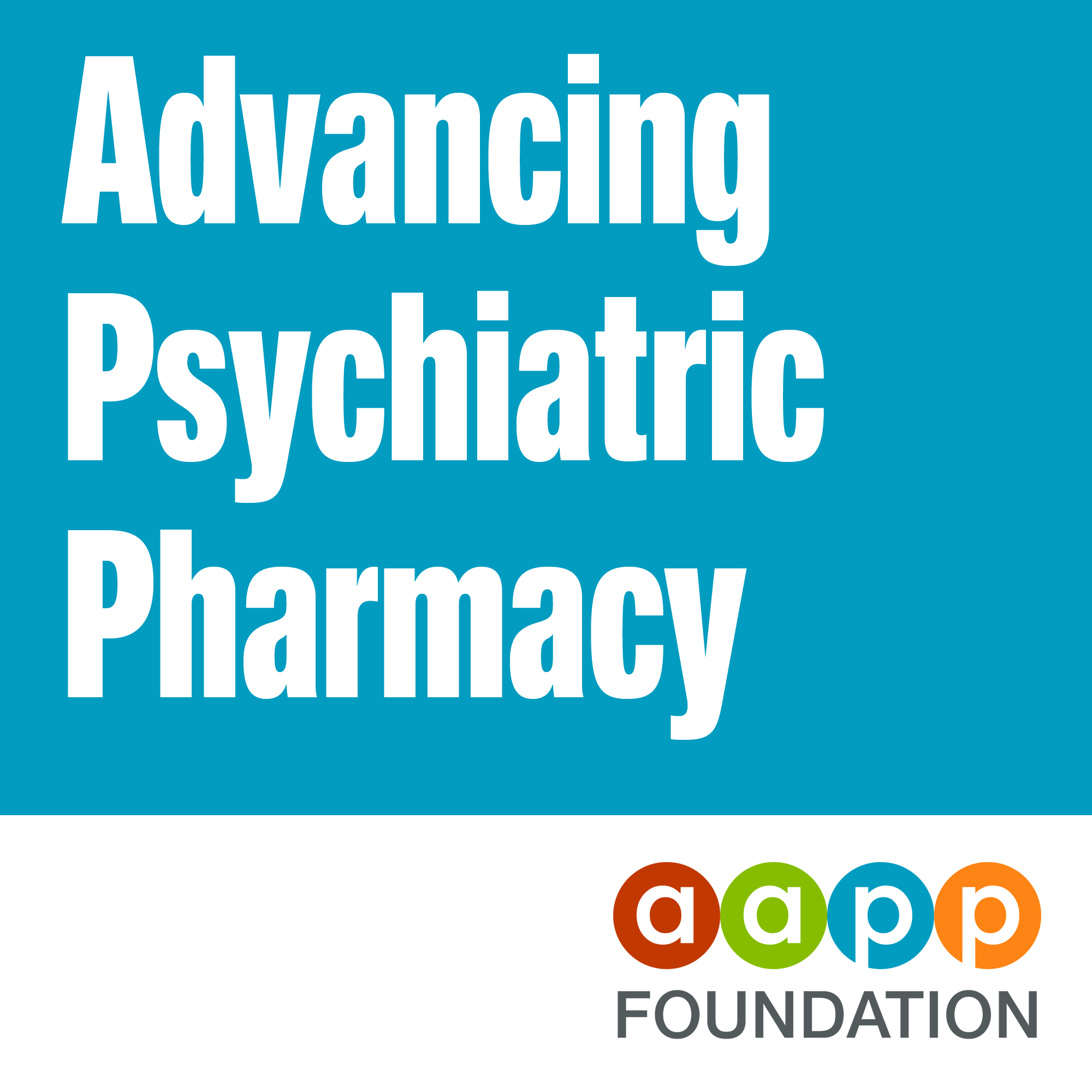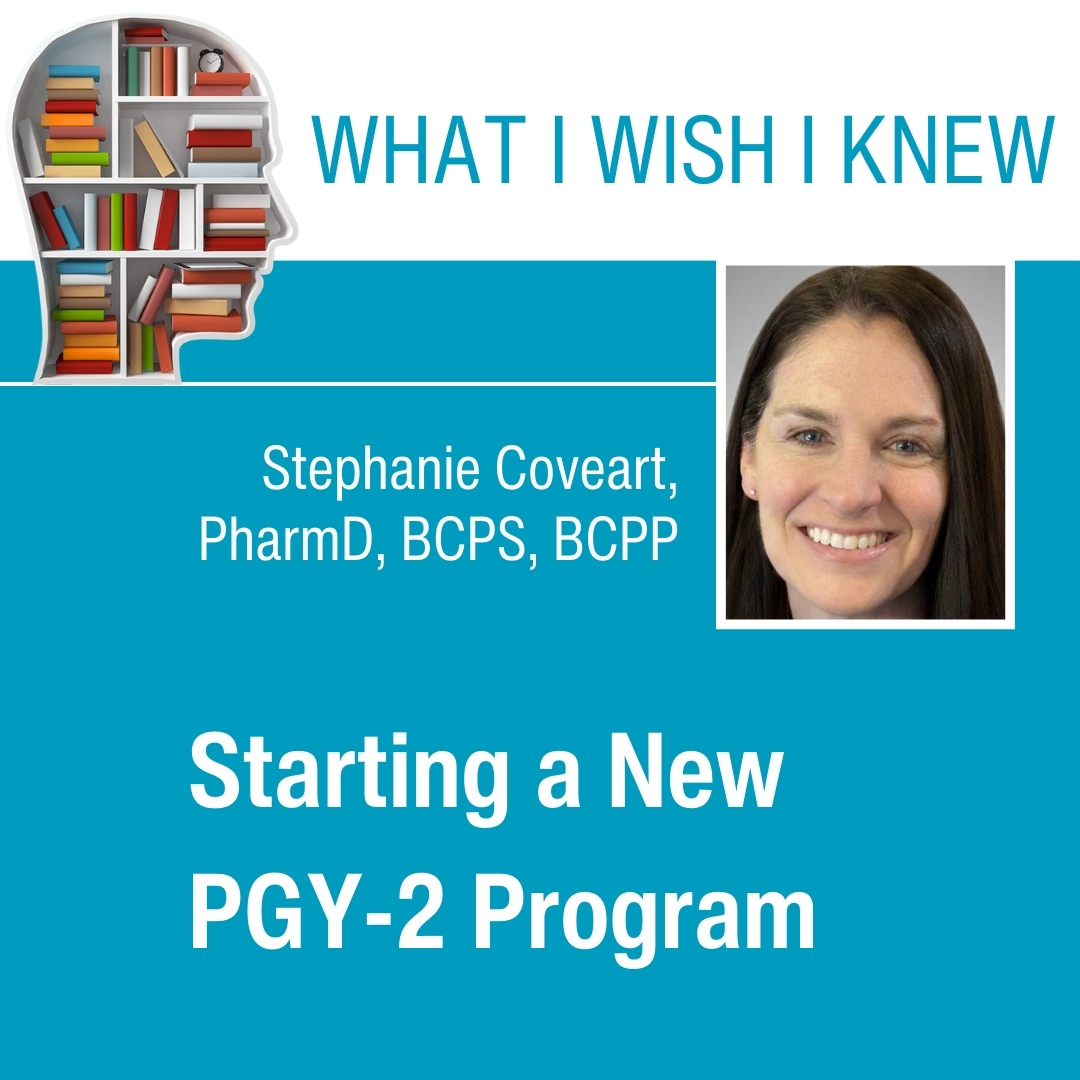News and Insights for Psychiatric Pharmacists
Final Call: AAPP Survey Closing Soon
Time is running out to complete the AAPP Membership Survey. Your feedback will shape AAPP’s strategic direction. Take 15 minutes to share your insights and enter to win a $100 coupon! #AAPP #PharmacyAdvocacy
New Practice Setting Videos Showcase Outreach Pharmacy and Stewardship Program Leadership
In AAPP's two new practice setting videos, Jacqueline Parizher, PharmD, reviews her role and impact as an outreach pharmacist working on the ground with individuals living with substance use disorders while Kesoma Holcomb, PharmD, BCPS, BCPP, explains her role in combining internal medicine with opioid and psychotropic stewardship.
AAPP Announces New Student Chapter
AAPP is pleased to announce an additional AAPP Student Chapter bringing the total number of student chapters to 48! University of Florida, advised by AAPP member John Markowitz, PharmD, is the newest student chapter. Congratulations and welcome to AAPP Collegiate Chapter at University of Florida!
What I Wish I Knew - The Importance of Networking and Professional Development
"One of the most important lessons I have learned is that professional development does not depend on having a specific title or years of clinical experience but instead depends on early intention and curiosity."
Electronic Intervention for Patient-Managed Benzodiazepine Tapering
According to a study in JAMA, the use of an electronically delivered self-management intervention called EMPOWER-ED was associated with a fivefold greater likelihood of benzodiazepine (benzo) cessation compared with usual care in long term benzo users.
MHC Journal Awards
Mental Health Clinician (MHC) is a valuable resource for psychiatric practitioners and researchers and contributors are key to its success. Please visit the linked MHC webpage to recognize all of the individuals honored.
President's Blog: Connection and Belonging Key in Today’s World
As President, I am honored to reflect on the moments that shape our association. Belonging, in my perspective, is more important now than ever. It grows when we recognize each other’s contributions and celebrate our shared work in psychiatric pharmacy and in advancing the profession through AAPP.
New JAMA Psychiatry Study Estimates $366.8 Billion Annual Cost of Schizophrenia with State-by-State Breakdown
A new study published in JAMA as conducted in collaboration by researchers at the Schizophrenia & Psychosis Action Alliance, Blue Persimmon Group, and Precision AQ, finds that schizophrenia’s economic burden spans healthcare, housing instability, & lost economic participation.
Health, Costs, and Injection-Related Infections at a Hypothetical Overdose Prevention Center
These results suggest that overdose prevention centers are cost-saving upstream interventions to mitigate injection-related infections and hospitalizations.
Assessing the Initial Impact of X-Waiver Elimination on Buprenorphine Prescribing for Opioid Use Disorder
In this retrospective analysis of a large EHR dataset, they found that following the elimination of the X-waiver, the incidence of new OUD diagnoses declined by 2%, while subsequent buprenorphine initiation increased by 14%.
Economic Evaluation of Tobacco Treatments From the Screen ASSIST Lung Cancer Screening Trial
These findings suggest that health systems can use this favorable incremental cost per quit and transparent cost estimation to promote wider implementation of the intervention.
HealthWell Foundation Webinar on February 26: Financial Assistance Across the Continuum of Care
Each session in this webinar series will spotlight real-time, actionable solutions and showcase innovative partnerships that help patients navigate financial toxicity with clarity and support.
Upgrade to CPE Monitor Plus to Maximize Your CPE Experience
CPE Monitor Plus is an upgraded feature within the ACPE CPE Monitor system that provides you with a more robust and personalized way to manage your professional development. It allows you to access your comprehensive CPE transcript on demand, receive proactive notifications about your license renewal dates, and helps you see how your completed CPE activities align with your specific licensure requirements. The Plus plan is $12 a year.
BPS Seeking Standard Setting Panelists
BPS is seeking psychiatric pharmacists to serve as standard setting panelists. You can apply through March 2, 2026.
National Academies Workshop on Precision Medicine in Neuroscience
Register for a workshop exploring the possibilities for integrating precision medicine into neuroscience research and care. The event will be held at the National Academies Keck Center in Washington D.C. and livestreamed online on March 4 from 2:00 PM to 5:00 PM ET and March 5 from 9:30 AM to 4:00 PM ET.
New SAMHSA Resource - Integrating Substance Use Disorder Prevention with Physical Health Care: Progress in States
The report and webinar examine current approaches to integrating SUD prevention with physical health care at the state level including implementation, financing, partnerships, challenges, and support needs, particularly for adolescents, and where states are in the implementation of services. Expanding access to Preventing substance misuse, abuse, and addiction is one of the core strategic priorities for SAMHSA and aligns closely with the Make America Healthy Again initiative.
The Washington Post: A Solution To The Doctor Shortage Could Be Just Down The Street: Pharmacists in many states remain legally prohibited from providing care they are trained to deliver.
Pharmacist education includes patient assessment, differential diagnosis, laboratory testing, drug administration and prescribing.
“It's like scratching at the door”: Experiences of outpatient buprenorphine low dose initiation among people using fentanyl
This study found that barriers and facilitators to LDI completion were linked to five COM-B model components: physical capability, physical opportunity, social opportunity, reflective motivation, and automatic motivation.
Early Registration Closes March 19
Register by the March 19th early registration deadline to pay the lowest rates for AAPP 2026! The AAPP Annual Meeting is the premier event for psychiatric pharmacotherapy education and networking, and we can't wait to host AAPP 2026 in the Pacific Northwest, April 19-22, 2026.
2026-2027 Member Submitted Programming Proposals Due March 12
Calling all subject matter experts! AAPP is encouraging all members to self-nominate for a presentation or author opportunity in AAPP’s upcoming events and products. Mark your submission as final by the March 12, 2026, deadline.
Represent Psychiatric Pharmacy! Order AAPP Apparel by March 2
Order your t-shirts, polo, sweater, sweatshirts, and more, and walk in style in your AAPP gear! The store will close on March 2. Grab your psych pharmacy colleagues and order together to save on shipping!
AAPP Announces 2026 Research Award Finalists
Nearly 200 abstracts will be featured at the AAPP 2026 Annual Meeting. Posters will be displayed Monday, April 20-Tueday, April 21, 2026. Congratulations to the eight (8) award finalists in the running for five AAPP research awards in 2026. Award finalists will present their abstracts during the platform presentations on Sunday, April 19, at AAPP 2026. Winners for all categories will be announced on Monday, April 20, 2026.
Problem Solving
Every brain = different. Psych pharmacists customize the treatment plan. #choosepsychpharmacy #pharmd #psychpharm #AAPP
AAPP Foundation Awards DEI Travel Grant to AAPP 2026
The AAPP Foundation is pleased to announce Melanie Rovelo, PharmD, as the 2026 Diversity, Equity, and Inclusion (DEI) Travel Grant recipient.
Complimentary Clozapine Education Series
Earn up to 5.5 ACPE contact hours during this on-demand, seven-part educational series! Webinars are immediately accessible. Register and start today!
National Academy of Medicine Seeking Stories for Clinician Well-Being Collaborative
The National Academy of Medicine (NAM) Collaborative is seeking to spotlight real-life stories as part of their Healthy Providers, Healthy Patients campaign. If you have a meaningful patient-provider interaction to share, you can complete this form by February 16.
Time trends in the male to female ratio for autism incidence: population based, prospectively collected, birth cohort study
Findings indicate that the male to female ratio for ASD has decreased over time and with increasing age at diagnosis.
Reforms to PBM Practices Passed
The National Community Pharmacists Association has summarized the federal reforms to pharmacy benefit manager practices signed into law via the recent funding bill signed by President Trump. The measures are contained in a bill to fund the Department of Health and Human Services. The new law requires the Centers for Medicare & Medicaid Services to define and enforce “reasonable and relevant” Medicare Part D contract terms, and gives enforcement authority; promotes transparency by allowing CMS to track payment trends to pharmacies and pharmacy inclusion in PBM networks, including a new designation of essential retail pharmacies; and prohibits PBM compensation in Medicare Part D from being tied to the manufacturer’s list price of a drug in an effort to reduce drug prices and save money for taxpayers.
Karavolis and Salwan Selected as Inaugural Recipients of Early Practitioner Award
Zoe A. Karavolis, PharmD, MPH, BCPP and Aaron Salwan, PharmD, MPH, BCPP are the recipients of the first AAPP Early Practitioner Award which recognizes the efforts of psychiatric pharmacists in the first 5 years of practice. Drs. Karavolis and Salwan have demonstrated commitment to AAPP and its mission and contributed to the advancement of psychiatric pharmacy practice through research, publications, presentations, mentoring, and the development of new psychiatric pharmacy practices or programs.
Passion + Purpose
Science that helps people. That’s the job of a psych pharmacist. #choosepsychpharmacy #pharmd #psychpharm #AAPP
Job Opportunities in Veterans Affairs
This blog series by the Resident and New Practitioner Committee is targeted to psychiatric pharmacists seeking their first or a new position. Throughout the spring of 2026, this series will feature interviews with hiring managers in various types of settings.
Your Input Materially Impacts AAPP Strategy
How is the specialty evolving? Help AAPP better serve you and the specialty by completing the Membership Survey. Your feedback is crucial, and you could win a $100 coupon. Take the survey today. #AAPP #PsychPharm
Antipsychotic prescribing patterns in a state psychiatric hospital with predominantly forensic admissions
High-dose antipsychotic use and APP was common in this U.S. state psychiatric hospital.
One Year Later: The End of the Clozapine REMS
Since the FDA ended the Clozapine REMS last February, some clinicians have embraced new Delphi guidelines that reduce monitoring frequency—while access to the medication has remained limited.
Largest leucovorin-autism trial retracted
A reanalysis of the data revealed errors and failed to replicate the results.
Student Grants Awarded for AAPP 2026!
Thanks to generous AAPP Foundation donors and the AAPP Past Presidents' Destiny Fund, 33 PharmD students were awarded full, in-person student registration grants to AAPP 2026! Congratulations to each of the recipients.
2026 Recertification Products Now Available for Registration
All 2026 BCPP Recertification products are available for pre-registration. Although course materials and examinations are not available until release dates, you can pre-register and order online today! Consider making these products part of your BPS Continuing Professional Development plan!
Benzodiazepine Tapering: A Marathon, Not a Sprint
This commentary explores implications for addiction treatment.
A Long-acting Naltrexone Implant (iSTEP-N) for Opioid Use Disorder
At the 9.6 g dose, iSTEP-N provided sustained therapeutic naltrexone exposure for 12 weeks with a favorable safety profile, while releasing less than one-fourth of its drug content.
Impact of Medication for Opioid Use Disorder on Patient Directed Discharge Among Patients with Opioid Use Disorder
Receipt of inpatient MOUD was associated with a statistically significant reduction in PDD among those with OUD and without evidence of MOUD before admission when compared with propensity-matched admissions which did not receive inpatient MOUD.
Medication Availability for Alcohol Use Disorder in Substance Use Disorder Treatment Facilities
Policies supporting MAUD-providing facilities may be needed to address persistent gaps in access.
AAPP Pharmacist Toolkit: Buprenorphine Initiation and Dosing Strategies
Free toolkit provides tips and guidance in the following areas of Buprenorphine Initiation: Buprenorphine Treatment, Traditional Buprenorphine Initiation, Low Dose Overlap Initiation, Special Populations, Harm Reduction, Helpful Resources, and References
Practice Settings
Psychiatric pharmacists can be involved in a number of clinical services involving therapy modification that is stated within a collaborative practice agreement with a physician. This may include initiating/monitoring/continuing/adjusting medications, injection services, device management, side effect management, and laboratory follow-up. These models can align incentives for patients, providers and payors that improve outcomes and reduce healthcare costs.
AAPP Polos, T-shirts, and More! Order by March 2
Represent psychiatric pharmacy and your home association with AAPP-branded apparel! The store will close on March 2, and all items will be created and shipped after that date. Order now and proudly wear your AAPP-branded merchandise at AAPP 2026!
What I Wish I Knew - Starting a New PGY-2 Program
Have you considered starting a new PGY-2 Psychiatric Pharmacy residency program at your facility but have no idea where to begin? Here are some considerations and starting points to help the process feel less overwhelming.
New Policy Brief Advocates for the Evidence-Based Treatment of Autism Spectrum Disorders (ASD)
Check out AAPP's newest policy brief stating our support for the evidence-based treatment of autism spectrum disorder based on an accurate assessment of the available data.
Foster Care Policy Recommendations Promoted by AAPP
AAPP issues policy recommendations supporting access to psychiatric pharmacy care for foster care youth. AAPP urges each state to include BCPP(s) on the foster care team and state DUR committees and urges CMS to provide best practice guidance to states.
What does the future of work look like for psychiatric pharmacists?
Your feedback matters. Complete the AAPP Membership Survey to guide strategic planning as we work to prepare psychiatric pharmacists for AI and other shifts in the workforce. It takes just 15 minutes, and you could win a $100 coupon. Share your input today! #AAPP #PharmacyLeadership
Developing Effective Test-Taking Skills
Exams can be daunting. Let us help! Register for the Developing Effective Test-Taking Skills webinar to sharpen your skills. #BCPP #examprep #psychpharmacy #AAPP
JCPP Releases Key Elements of a Pharmacist Practice Management Ecosystem
The Joint Commission of Pharmacy Practitioners (JCPP) has released a new document titled Key Elements of a Pharmacist Practice Management Ecosystem (January 14, 2026). This publication defines the essential components of the pharmacist’s practice management system—one of the three core dimensions of a comprehensive pharmacist professional patient care practice.





